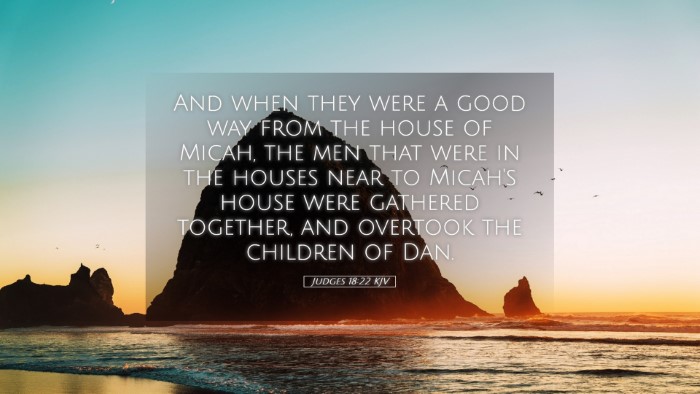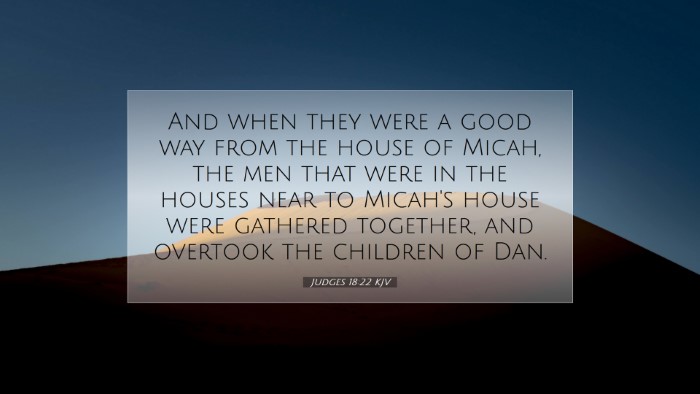Bible Commentary on Judges 18:22
Verse Overview: Judges 18:22 states, "When they had gone some distance from the home of Micah, the men who lived near Micah were called together and overtook the Danites." This verse is part of the larger narrative concerning the tribe of Dan and its quest for a permanent inheritance in the Promised Land, illustrating themes of idolatry, conflict, and the search for identity.
Contextual Analysis
The Book of Judges presents a period of Israel's history characterized by moral ambiguity and the struggle for territorial settlement. The narrative of the Danites in Judges 18 is significant, showing their departure from God’s assigned land and their encounter with idolatry.
Insights from Matthew Henry
Matthew Henry emphasizes that the behavior of the Danites reflects their spiritual decline. He notes that their initial reluctance to conquer the land assigned by God resulted in their wandering and eventual oppression. This passage illustrates how their search for security led them to compromise their faith, as they turned to the idolatrous practices of Micah's household.
- IDOLATRY: Henry points out that the Danites’ integration of Micah's idols into their worship signifies a significant deviation from the covenant that God established with Israel.
- COMMUNITY RESPONSE: The overtaking of the Danites by the local populace shows a profound disconnect between the tribes of Israel and the divine mandate they were meant to uphold.
- MORAL IMPLICATIONS: Henry challenges readers to reflect on the society's moral failures when individuals or tribes deviate from their godly paths.
Insights from Albert Barnes
According to Albert Barnes, this verse serves as a crucial turning point that demonstrates the tensions within the Israelite tribes. He elaborates on the geographical and cultural significance of the Danites’ journey, pointing out their tactical advantages contrasted with their moral defeats.
- GEOGRAPHICAL SIGNIFICANCE: The movement of the Danites towards Laish illustrates their strategic choice of land; however, it is touched by their flawed moral compass, emphasizing that success devoid of divine direction is futile.
- ETHICAL CONFLICT: Barnes discusses the implications of conquest without divine sanction, suggesting that such violence is indicative of a deeper moral failure marked by disobedience and spiritual blindness.
- FINAL OUTCOME: He underscores that the events following this overtaking lead to dire consequences not only for the Danites but also for Israel as a whole, marking a watershed moment in their collective journey.
Insights from Adam Clarke
Adam Clarke provides a detailed exegesis of the passage, bringing out the socio-political dynamics at play. He interprets the overtaking of the Danites as a significant illustration of the conflict between personal ambition and collective faith.
- SOCIAL DYNAMICS: Clarke points out that the fear of retribution among the local tribes is indicative of the widespread knowledge of Israel’s past victories and their reliance on God.
- SPIRITUAL APOSTASY: He highlights that the Danites' willingness to engage with idolatry represents a larger apostasy within Israel, raising questions about their national identity.
- A CALL TO REPENTANCE: Clarke urges modern readers to understand that this passage serves as a reminder of the necessity for spiritual integrity amidst societal pressures.
Thematic Reflections
The themes arising from Judges 18:22 are multifaceted, addressing issues of identity, community, and faithfulness. The response of the local inhabitants signifies a collective awareness of the spiritual and moral decline of Israel.
- IDENTITY CRISIS: The Danites’ journey illustrates a crisis of identity; driven by fear and insecurity, they abandon their God-given heritage.
- COMMUNITY AND CONFLICT: The overtaking signifies the tensions between different Israelite tribes as they wrestle with their individual desires and God’s commands.
- CALL TO FAITHFULNESS: Ultimately, the narrative serves as a cautionary tale about the importance of remaining true to God’s commandments amidst temptation and adversity.
Practical Applications
For pastors, students, and theologians, the richness of Judges 18:22 offers several practical applications:
- Spiritual Vigilance: This passage encourages believers to be vigilant against the temptations of idolatry, even in subtle forms.
- Understanding Community Dynamics: Church leaders can draw parallels between the tensions within Judges and modern community dynamics, fostering discussions on unity and diversity within the body of Christ.
- Holy Identity: This text challenges the faithful to embrace their identity as children of God, resisting the allure of cultural pressures that may lead to compromise.
Conclusion
Judges 18:22 vividly encapsulates the complex interplay of fear, ambition, and spiritual decline among the tribes of Israel. Through the lens of commentaries from Henry, Barnes, and Clarke, readers are compelled to scrutinize their own spiritual integrity and the broader implications of their communal identity.


